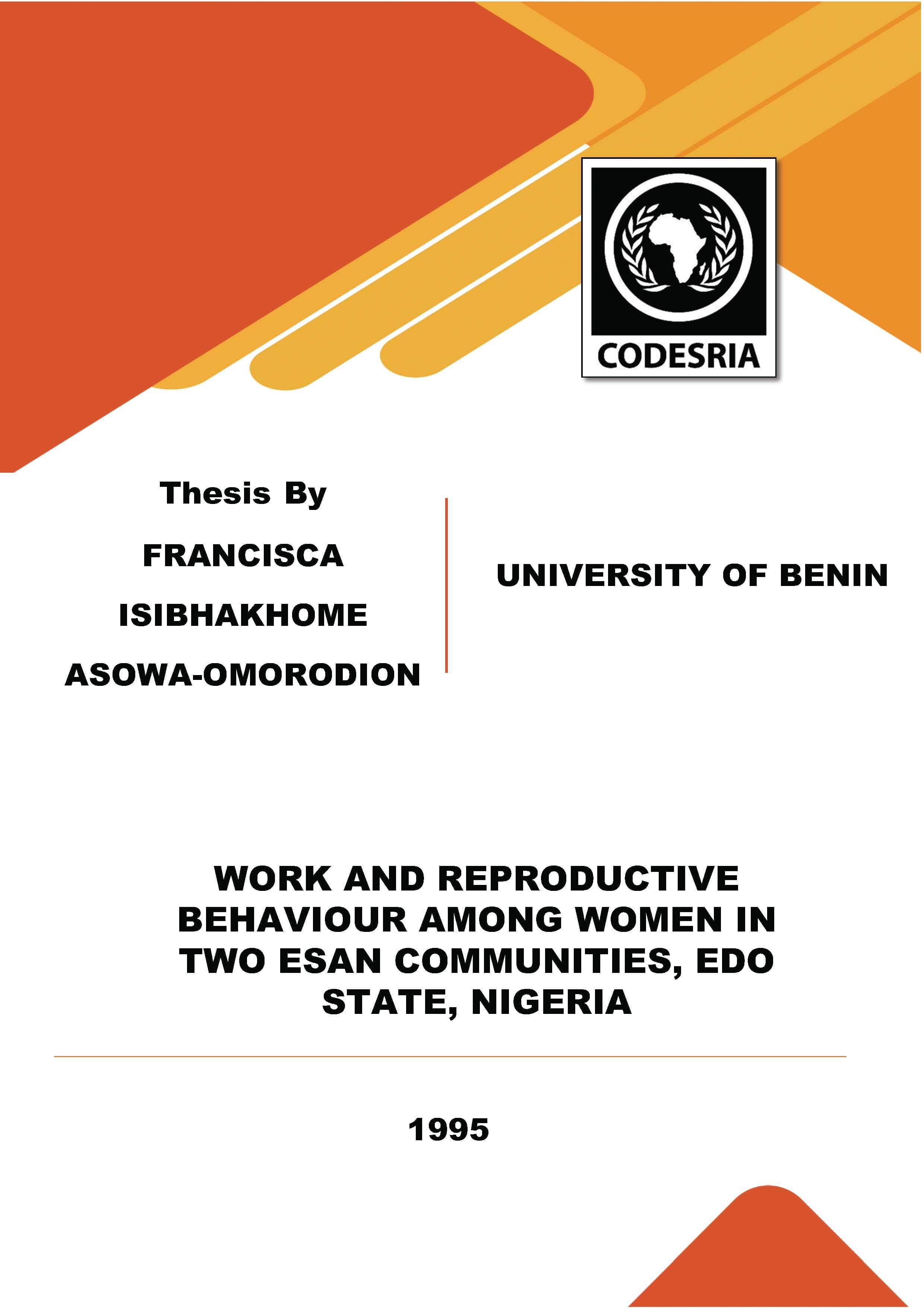Work and reproductive behaviour among women in two esan communities, Edo state, Nigeria
Keywords:
Fertility, pregnancy, child rearing, women workers, sexual behaviour, reproduction, marriage, reproductive behaviour, NigeriaSynopsis
The increasing population of most developing countries like Nigeria has been a major concern of government, scholars and international bodies and agencies such as Rockefeller, United Nations and World Health Organizations: There has been tremendous effort to understand the nature and factors contributing to this increasing population Also, several attempts have been made to provide explanations and recommend strategies towards reducing such population. Prominent among these strategies are programmes and policies designed to improve female education, increase the proportion of women in the
formal sector of the labour force and to increase the number of modern contraceptors. Somehow, it has become increasingly clear that population has continued to increase. Thus, showing that other variables could be responsible for such increasing population. There also appears to be a gap between the sociological, economic and cultural explanations for the relationship between work and reproductive behaviour of women. This study seeks to fill that gap by focusing on the nature of work Esan women do as a possible explanation for their reproductive behaviour. The study adopts the socio-cultural approach , which involves generating both qualitative, baseline, ethnographic and quantitative delta. The qualitative data are generated using interviews, observation, oral tradition, focus group and group discussions, while the quantitative date are generated
using the questionnaire instrument. The questionnaires were administered to women only. These women were chosen from households and were selected by systematic sampling from the listed households in the studied communities. These women are also of reproductive age 15-55 years, with at least one living child. This approach does not depart from the conventional approach which usually generated information on women and children from their husbands.· Women in this study gave information on their husbands, children and family. Thus, their experiences and knowledge became the starting point towards understanding the context in which these women are located. The results show that Esan women are more into the traditional occupations such as farming and trading. Also, there are variations in the proportion of women from the studied communities, Ekpoma and Ubiaja, in these and other jobs in the formal labour force. For example, the liberalization of the land use policy in Ubiaja, now allows Ubiaja women to own personal farm land. In addition, the involvement of Ubiaja women in long distance trading in the past decade influences their reproductive behaviour which invariably may account for the variation in fertility. Such variations arose because of the changes in cultural values and norms in Ubiaja, as well as the physical and infrastructural
developments in Ekpoma. The data further _show that fertility measured by number of living children is high in both studied communities, Ubiaja and Ekpoma. The variation in these fertility rates are due to the nature of work, the low rate of modern
contraceptors, reliance on extended family networks and adherence to traditional ways of childbearing and child rearing in Ekpoma. Although the sociological and economic explanations partially account for the work-fertility relationship, the emphasis is more on socio-cultural explanations. Finally, generalizations based on such findings can at best be cautious because of the various components that make up such multi-ethnic societies. Based on the research findings, it is suggested that an understanding of the cultural imperatives that influence the work women do and the reproductive behaviour of women of both major and minority ethnic groups in Nigeria are essential in the formulation and implementation of population policy and programmes. Designing and implementing programmes and policies that are 'foreign' or 'strange' to the people are
bound to fail and escalate the problem of increasing popuiation, as well as lower the standard of living. In essence, cultural demands have extensive influence on the peoples' way of life and their willingness to change.
Downloads
References
Adegbola, 0., 1987 "Regional and socio-economic Fertility Differentials in Niger, 1981- 82." !PD Working Paper, 1987-6, IPD, VUB, Brussels.
Adepoju A. (1985) Rural Migration and Development in Nigeria, Ile-lfe: Department of Demography and Statistics.
Abdalla, A.A, 1988: "Work experience of married women and desired fertility i[l: Egypt and Ghana", Studies in African and Asian Demography. Research Monograph Series No. 17: 293-315.
Ahmed, J, 1986. "Polygyny and Fertility among the Yoruba of Western Nigeria" Journal of Biosocial Science, 18, pp. 63-73.
Anker, R. (1983) "Female Labour Force participation in developing countries: A critique of current definition and data collection methods11, International Labour Review (Geneva ILO), Nov-Dec., Vol. 122, 6.
Anker, R. and M. Anker, (1982). Reproductive Behaviour in Households of Rural Gujurat: Social, Economic and Community Factors. New Delhi, Inda: Concept Publishing.
Anker, R. and J. Knowles. (1982). Fertility Determinants in Developing Countries: A Case Study of Kenya. Liege: Ordina Editions.
Arnold, F., R.A. C. Bulatao, C. Buripakoi, B.J Chung, J.T. Fawcett, T. Iritani, S.J. Less and T.S. Wu. (1975). The Value of Children: Introduction and Comparative Analysis. Vol. 1 Honolulu: East-West Population Insitiute.
Arowolo, 0.0. (1984) "Fertility Patterns in lbadan" in P.O. Sada & A.B. Osirike, Case Studies in Migration and Urbanization in Nigeria: Perspectives in Policy Issues. Department of ·Geography and Regional Planning, University of Benin, Benin City.
-----------(1977) "Fertility of Urban Yoruba Working Women: A Case study of Ibadan City,., The Nigerian Journal of Economics and Social Studies, 19rV'l:37-66.
-----------(1974) "A Regional Analysis of the Determinants Fertility in the Underdeveloped Areas of the World", The Nigerian Journal of Economic and Social Studies, 16, 2: 273-296.






